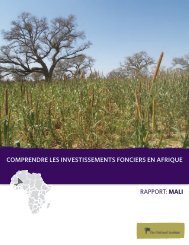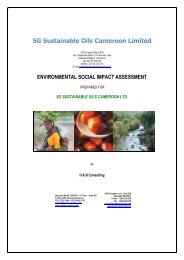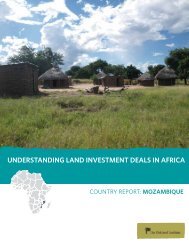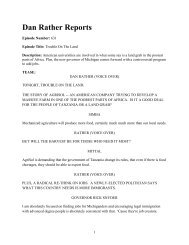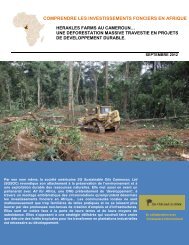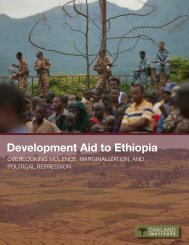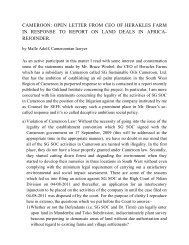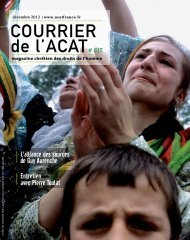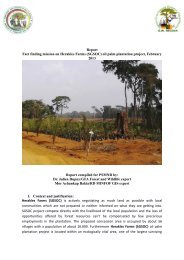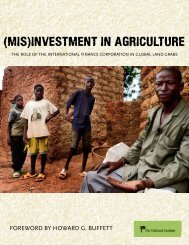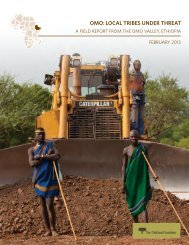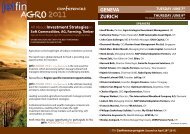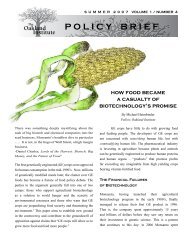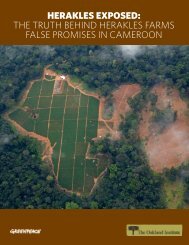understanding land investment deals in africa - Oakland Institute
understanding land investment deals in africa - Oakland Institute
understanding land investment deals in africa - Oakland Institute
- No tags were found...
Create successful ePaper yourself
Turn your PDF publications into a flip-book with our unique Google optimized e-Paper software.
concession agreements concern the manner <strong>in</strong> whichthey were negotiated. The GoSS M<strong>in</strong>istry of Agricultureand Forestry reportedly negotiated both agreementswithout the <strong>in</strong>volvement of either the state governmentor the affected communities. 124 When the companycame to the ground <strong>in</strong> 2008 to beg<strong>in</strong> construct<strong>in</strong>g itsproject facilities, it encountered a great deal of localopposition <strong>in</strong> the two states. The company was notpermitted to operate until they conducted a series ofstakeholder workshops <strong>in</strong> the two states to <strong>in</strong>formstate officials and residents <strong>in</strong> affected communitiesabout what to expect from the <strong><strong>in</strong>vestment</strong>. In WesternEquatoria, the concession agreement was alsoreviewed by the council of m<strong>in</strong>isters and debated <strong>in</strong> theparliament before the state government would allowthe company to beg<strong>in</strong> operat<strong>in</strong>g. 125The first few years were difficult for both the companyand the government. A state official <strong>in</strong> Western Equatoriaexpressed a sense of powerlessness <strong>in</strong> deal<strong>in</strong>g withthe company <strong>in</strong> those early days: “The company hadfriends on high and when they came down here to usat the local level, no one could say anyth<strong>in</strong>g to them.” 126In Central Equatoria, a local government officialrecalled his outrage when the GoSS tried to unilaterallyimplement the <strong><strong>in</strong>vestment</strong> without <strong>in</strong>volv<strong>in</strong>g the localcommunities, liken<strong>in</strong>g it to the actions of the Britishcolonial government:“Actually, the Loka teak plantation was plantedat the expense of the community, back <strong>in</strong> thosedays, dur<strong>in</strong>g the British time. If we are to go torealities, the community <strong>in</strong> this area will demandcompensation. If you claim to be the ownerof this forest, then you will have to pay thesepeople compensation, because first of all, theywere forcefully evicted from their houses [by thecolonial government]—their homes were actuallyburned. Two, people were conscripted to go andplant the plantations. This is the history when itcomes to teak plantations. It is never anyth<strong>in</strong>gthat is done out of communally mobiliz<strong>in</strong>gpeople to work. It is done through forced laborand harassment. Despite all this, the communityhas not benefited at all. We only have a s<strong>in</strong>glesecondary school at Loka, but the community andthe local government cannot even take a s<strong>in</strong>gleteak to sell it out and improve th<strong>in</strong>gs.” 127The current situation between the companies, theiremployees and the host communities rema<strong>in</strong>s verytense. Accord<strong>in</strong>g to a former state parliamentarian,when Equatoria Teak first came to Western Equatoria,the company promised that it would create 6,000 jobs<strong>in</strong> the state. When Equatoria Teak began operations,it reportedly hired about 600 people from the localcommunity to work <strong>in</strong> various capacities on thereserve. 128 Accord<strong>in</strong>g to several former employees,they signed a one-year contract with the company thatwas supposed to be renewed on a yearly basis. Theyclaimed that, aside from a handful of supervisors, theworkers were paid just seven Sudanese pounds per day(a little more than two USD) and that after three yearsof work<strong>in</strong>g for the company the contracts were neverreviewed. 129 In fact, accord<strong>in</strong>g to the employees, theywere not even allowed to take copies of their contractshome with them. 130 When the company encountereddelays <strong>in</strong> gett<strong>in</strong>g the necessary licens<strong>in</strong>g from thegovernment it decided to save money by cutt<strong>in</strong>g laborcosts. By the time it stopped project operations <strong>in</strong>Western Equatoria <strong>in</strong> October 2010, Equatoria Teakwas only employ<strong>in</strong>g approximately 250 people. 131Perhaps more worry<strong>in</strong>g than the meager employmentbenefits, are the reports of physical abuse by severalcompany supervisors. When several employeesfailed to show up to work, a South African supervisorreportedly gave them an option to either accept to bebeaten with a wooden stick or else be fired. Ratherthan lose their jobs, the employees reportedly chosethe beat<strong>in</strong>g. Several former employees <strong>in</strong>terviewedby OI also asserted that managers locked them <strong>in</strong>latr<strong>in</strong>es as punishment for various <strong>in</strong>fractions. Whenthe company’s CEO found out about the abuses, hepromptly fired the supervisor <strong>in</strong> question.As this case study demonstrates, the CDC andF<strong>in</strong>nfund’s <strong><strong>in</strong>vestment</strong> <strong>in</strong> South Sudan has hadmixed results. On the one hand, the concessionagreements <strong>in</strong>clude social benefits and attention toenvironmental impacts that are absent from most<strong>land</strong>-based <strong><strong>in</strong>vestment</strong>s <strong>in</strong> South Sudan. However, fordevelopment funds that portray themselves as sociallyresponsible <strong>in</strong>vestors, the Equatoria Teak and CentralEquatoria Teak <strong><strong>in</strong>vestment</strong>s fall short on several fronts.The lack of prior consultation and exploitative laborconditions raise serious concerns about the extent toThe Oak<strong>land</strong> <strong>Institute</strong> <strong>understand<strong>in</strong>g</strong> <strong>land</strong> <strong><strong>in</strong>vestment</strong> <strong>deals</strong> <strong>in</strong> <strong>africa</strong>: south sudan | 32



